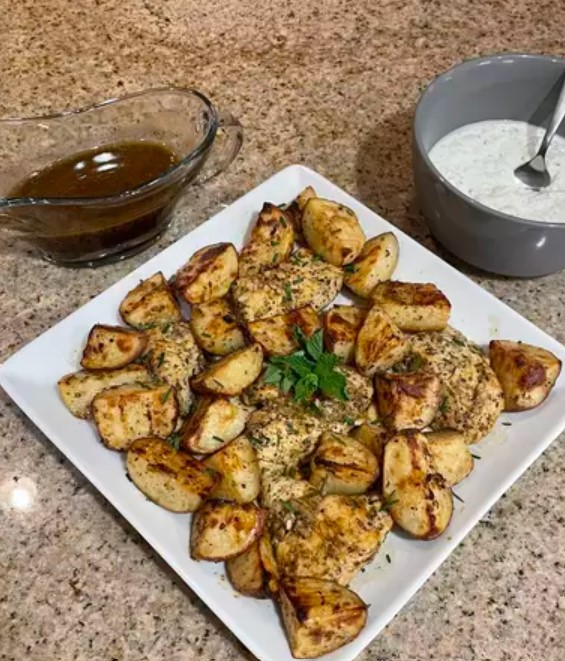Greek Lemon Chicken and Potatoes is a flavorful dish that, while delicious, also contains a mix of nutrients. Here’s a general breakdown of the nutritional content of this dish. Please note that these are approximate values and can vary based on specific ingredients and portion sizes.
Nutritional Breakdown per Serving (Assuming 4 Servings)
- Calories: A serving of Greek Lemon Chicken and Potatoes typically contains about 400–600 calories. The majority of these calories come from the chicken (especially if using skin-on pieces) and the olive oil.
- Proteins: Chicken is an excellent source of protein. A serving might offer around 25–35 grams of protein, depending on the size and cut of the chicken pieces.
- Fats: This dish can be relatively high in fats due to the olive oil and chicken skin. A serving might contain 20 to 30 grams of fat. However, olive oil provides healthy monounsaturated fats.
- Carbohydrates: Potatoes contribute to the carbohydrate content of this dish. A serving could have 30–50 grams of carbohydrates, largely depending on the portion size of the potatoes.
- Fiber: Potatoes also provide dietary fiber, though the amount is moderate. A serving might contain 2-4 grams of fiber.
- Vitamins and Minerals:
- Vitamin C: Potatoes and lemon juice are good sources of vitamin C.
- Potassium: Potatoes are high in potassium, which is beneficial for heart health.
- Iron: Chicken, especially dark meat, contains iron.
- Other Vitamins: Depending on the herbs and spices used, you might also get small amounts of other vitamins.
- Sodium: The sodium content can vary widely based on how much salt is used in the recipe. It’s important to moderate salt usage, especially for those watching their sodium intake.
Dietary Considerations
- Gluten-Free: This dish is naturally gluten-free, making it suitable for those with gluten sensitivities or celiac disease.
- Low Sugar: Greek Lemon Chicken and Potatoes is low in sugar, which is beneficial for those monitoring their sugar intake.
- Balanced Meal: When served with a side of vegetables or a salad, this dish can be part of a balanced meal, providing protein, carbohydrates, and healthy fats.
Tips for a Healthier Version
- Reduce Fat: Use less olive oil or remove the chicken skin to lower the fat content.
- Control Portion Size: Be mindful of portion sizes, especially for the potatoes and chicken, to manage calorie intake.
- Increase Fiber: Serve with a side of fiber-rich vegetables or a salad to increase the meal’s fiber content.
Remember, the actual nutritional content can vary based on how the dish is prepared and the specific ingredients used. For those with specific dietary needs or health concerns, it’s always a good idea to tailor recipes accordingly or consult with a nutritionist.
Expert Insights to Greek Lemon Chicken and Potatoes
Certainly! When it comes to Greek lemon chicken and potatoes, there are several expert insights that can elevate this dish, both in terms of flavor and nutritional value. Here’s a breakdown of some key points:
Culinary Expertise
- Marination Time: Experts suggest marinating the chicken for at least an hour, or ideally overnight. This allows the flavors to penetrate deeply, resulting in a more flavorful dish.
- Choice of Potatoes: Using the right type of potato is crucial. Waxy potatoes, like Yukon Gold, hold their shape well during roasting and absorb flavors beautifully.
- Balancing Flavors: The lemon should be balanced with the olive oil and herbs. Too much lemon can overpower the dish, while too little can make it bland.
- Herb Variations: While oregano is traditional, experimenting with thyme, rosemary, or a mix of Mediterranean herbs can add a unique twist to the dish.
- Cooking Technique: Roasting at a high temperature ensures a crispy exterior on the potatoes and a nicely browned skin on the chicken. Basting during cooking keeps everything moist.
For more details, you can visit the full recipe on AllRecipes: Greek Lemon Chicken and Potatoes.
Nutritional Insights
- Healthy Fats: Olive oil, a staple in Mediterranean cooking, is rich in monounsaturated fats, which are heart-healthy. Choosing high-quality extra virgin olive oil can also add antioxidants to the dish.
- Protein Source: Chicken, especially the darker cuts like thighs and drumsticks, provides high-quality protein and essential amino acids.
- Low-Carb Option: For a lower-carb version, reducing the number of potatoes or substituting with lower-carb vegetables like cauliflower can be an effective strategy.
- Adding Vegetables: Incorporating vegetables like bell peppers, onions, or cherry tomatoes into the roasting pan can boost the dish’s vitamin and mineral content.
Serving Suggestions
- Pairing with Sides: Serving this dish with a fresh Greek salad, steamed vegetables, or a light grain like quinoa can balance the meal.
- Pairing: A crisp white , like a Sauvignon Blanc or a Greek Assyrtiko, can complement the lemony flavors of the dish.
Storage and Reheating
- Proper Storage: Cooling the dish quickly and refrigerating it in airtight containers helps preserve its quality and prevent bacterial growth.
- Reheating Techniques: Reheating in an oven or air fryer can help maintain the texture, especially the crispiness of the potatoes, better than in a microwave.
History to Greek Lemon Chicken and Potatoes
Greek Lemon Chicken and Potatoes is a classic Mediterranean dish that reflects the rich culinary history of Greece and the broader Mediterranean region. While specific historical records about this dish may not exist, its roots are deeply embedded in the traditional cuisine of the Mediterranean.
Mediterranean Culinary Traditions
The Mediterranean diet is renowned worldwide for its health benefits and delicious flavors. It is characterized by an abundance of fresh vegetables, fruits, olive oil, lean proteins, and aromatic herbs. Greek cuisine, in particular, emphasizes the use of olive oil, herbs, and citrus fruits like lemons. These elements are prominently featured in Greek lemon chicken and potatoes.
Use of Olive Oil
Olive oil has been a staple in Mediterranean cooking for thousands of years. It was used extensively by the ancient Greeks and Romans for its versatility, flavor, and health benefits. In Greek Lemon Chicken and Potatoes, olive oil is not only a source of healthy fats but also adds a rich and distinctive flavor to the dish.
Traditional Greek Herbs
Herbs like oregano, rosemary, and thyme are integral to Greek cuisine and have been used in Mediterranean cooking for centuries. These herbs are often found in the marinades and seasonings of Greek dishes, imparting a unique aroma and taste to the food.
Evolution Over Time
While the specific combination of lemon, chicken, and potatoes may not have historical records, it’s likely that this dish has evolved over time through the experimentation and culinary traditions of Greek households. As generations of Greek cooks passed down their recipes, this flavorful combination likely emerged as a beloved family favorite and eventually became a popular dish in Greek and Mediterranean restaurants worldwide.
Modern Popularity
Today, Greek lemon chicken and potatoes are a well-known and widely enjoyed dish both in Greece and beyond. It has found a place on menus in Greek restaurants and has been adapted to various regional and personal preferences. Its enduring popularity is a testament to the timelessness of Mediterranean flavors and the appeal of dishes that showcase fresh, simple ingredients.
In summary, while the specific history of Greek lemon chicken and potatoes may be undocumented, its roots are deeply intertwined with the culinary traditions of Greece and the broader Mediterranean region. This dish embodies the timeless appeal of Mediterranean flavors and continues to be a beloved and flavorful part of modern Greek cuisine.
conclusion to Greek Lemon Chicken and Potatoes
In conclusion, Greek Lemon Chicken and Potatoes is a delightful and flavorful dish that embodies the essence of Mediterranean cuisine. While its specific historical origins may remain undocumented, this dish represents a harmonious blend of fresh ingredients, traditional culinary techniques, and the timeless appeal of Mediterranean flavors.
The use of olive oil, fragrant herbs, and zesty lemons in this dish reflects the rich culinary heritage of Greece and the Mediterranean region. Over time, it has evolved to become a beloved classic in Greek households and restaurants around the world, showcasing the enduring popularity of this flavorful combination.
Whether served for a family dinner or at a Greek restaurant, Greek Lemon Chicken and Potatoes continues to captivate taste buds with its vibrant and harmonious flavors. Its simplicity, yet depth of taste, makes it a true representation of the Mediterranean culinary tradition, where the quality of ingredients and the mastery of flavors take center stage.
As we savor each bite of tender chicken, crispy potatoes, and the bright zest of lemon, we celebrate the rich history and the enduring culinary legacy that this dish embodies. It reminds us of the timeless magic that can be created with just a handful of fresh, wholesome ingredients and the artistry of Mediterranean cooking.
FAQs about Greek Lemon Chicken and Potatoes

